APRIL FOOL’S GOLD: Acadia Center Responds to Latest Fossil Fuel Interest Attacks on Clean Energy Policies in New England
MEDIA CONTACT:
Kyle Murray
Director, State Program Implementation
kmurray@acadiacenter.org, 617-742-0054 ext.106
No, it’s not an April Fool’s Day prank: following their easily debunked November energy cost report, fossil fuel-interest think tanks are back with a new round of the same tired and misguided attacks against clean energy policies in New England. Today, the groups – including Americans for Prosperity, the Josiah Bartlet Center for Public Policy, the National Federation of Independent Businesses, the Maine Policy Institute, Massachusetts Fiscal Alliance, and Rhode Island Center for Freedom and Prosperity – held an online press conference to discuss “the effects of alternative energy mandates on the region’s taxpayers.” Since their last flawed analyses, New Englanders have endured a cold and costly winter when it comes to energy bills. The tally of these costs lays bare the region’s untenable overreliance on fossil fuels, with rising energy burdens driven by natural gas infrastructure, generous utility profits, and the region’s continued fossil fuel investments – all exacerbated by reckless actions from the Trump Administration.
With the costs of New England’s fossil fuel reliance growing, clean energy and energy efficiency now have the potential to deliver even greater benefits to families and businesses across the region, by mitigating and avoiding precisely the kind of price spikes seen this winter. New England wholesale electricity costs exceeded $10 billion in 2024 for the third time in four years, a period that saw natural gas grow to unprecedented levels of overreliance (51% of net energy for load in 2024). One program giving payments to dual-fuel (gas-oil) power plants, the inventoried energy program (IEP), cost ratepayers almost $80 million over just five days this winter. And gas heating customers felt the pain too, with natural gas spiking to an average of almost $17/MMBtu in the month of January (a 120% increase over the prior January), and the region’s growing gas distribution networks pushing up delivery costs to previously unseen levels. Energy efficiency programs like Mass Save, touted as the Boogeyman for rising costs, are actually saving customers money by preventing needless additional expenditures on fossil fuels at such costly rates. For example, Rhode Island’s 2024-2026 energy efficiency plan is helping avoid almost $50m in added costs if load was instead met by purchasing additional electric supply.
Figure 1 and 2: New England Wholesale Electricity Costs and Sources of Grid Electricity (source: ISO-NE)
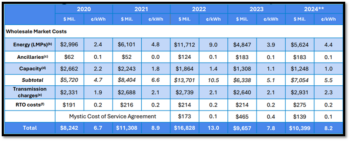
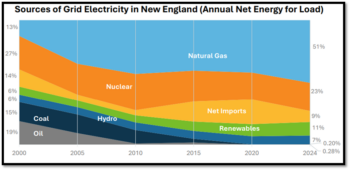
The takeaway for the region remains true: New England has a once-in-a-generation opportunity to redesign and revolutionize its energy system with clean energy and localize the job-creation and GDP impact of energy expenditures within the regional economy, rather than export them afar. Right now, the region has almost all its eggs in the fossil fuel basket, and this offers only the false promise of fool’s gold in protecting the region’s consumers from rising energy bills. The region must double down on its climate and clean energy goals to make the broader northeast region energy independent from fossil fuels, reduce consumer price spikes, and mitigate the economic harms of worsening climate change.
It’s time to set the record straight once again:
False claim #1: the region’s aggressive renewable climate energy policies are a major driver of high utility bills in New England.
Don’t let them fool you: New England spends $76b per year on energy, the majority of which still goes to fossil fuels from outside the region (source: EIA data for 2022). Plus, it was very, very cold this winter; the coldest winter since 2014-2015, in fact.[1] According to data compiled by Acadia Center (see figure 3 and 4 below), the average temperature in December 2024 was a full 10°F colder than December 2023. Further, from December 2024 through February 2025, Massachusetts saw 23 days colder than 20°F, compared to only nine such days the year prior. These colder temperatures generally mean that residents are using more energy, driving up bills.
Figures 3 and 4: Quantifying Winter 2024-2025 Cold Intensity (source: Acadia Center)
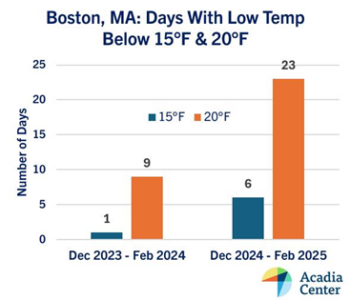
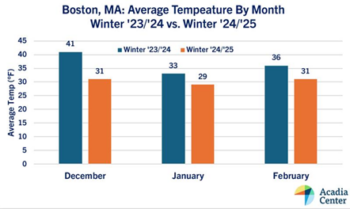
However, due to the Commonwealth’s overreliance on natural gas and other fossil fuels, it also means higher costs for the supply of energy. As America exports more liquefied natural gas (LNG) abroad, domestic gas prices are increasingly tied to the unpredictability of global gas markets, leading to increased price volatility for consumers. By contrast, renewable energy contracts provide a means of locking in affordable prices/rates over a long period of time, helping hedge and insulate the region from the volatile swings in fossil fuel commodity prices seen this winter. Had the Trump Administration not brought offshore wind development to a grinding halt, more high-value offshore wind resources would be available to mitigate winter price spikes and deliver much needed winter resource adequacy in the winters to come.
On the gas side, existing gas customers pay a disproportionate share of the costs for bringing new customers online. Since 2018, existing gas customers have footed the bill for 80% of all new gas customer connections. And these subsidies – known as line extension allowances – are driving up gas bills for everyone. In 2023 alone, Massachusetts gas customers were charged $160 million to add new customers to the gas system, to the tune of $9,000 per new customer, which is reflected on ratepayer gas bills. The cost of adding new customers is rising as well: the average cost of adding new customers rose 50% between 2020-2021 and again in 2022-2023. In fact, despite an acknowledgement by the state and by utilities that we should be winding the gas system down – not expanding it – the growth of the sprawling pipe network shows no signs of stopping. According to analysis from the Attorney General’s Office in Massachusetts, the path we’re currently on could see the state’s gas rate base – the total value of gas system assets on which utilities are allowed to earn a rate of return – jump from $10 to $20 billion in the span of roughly a decade, when factoring in the cost of new and replaced gas pipes.
Figure 5: Analysis of Growth Trajectory for Gas System Rate Base in MA (source: Joint Direct Testimony of Brattle Group on behalf of the MA Attorney General’s Office, DPU 24-GSEP-01, Feb. 2025)
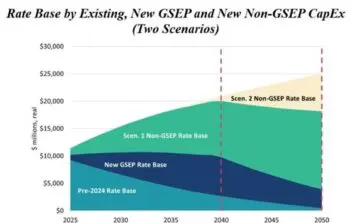
False claim #2: state laws requiring net zero by 2050, which are driving up costs for families and businesses.
As we wrote back in November, extensive modeling previously conducted by Massachusetts for the Commonwealth’s ‘2050 Decarbonization Roadmap’ and Clean Energy and Climate Plans (CECP) provide evidence for a much different trajectory for regional energy prices tied to achievement of 2050 climate targets. These studies included granular region-wide energy system modeling to arrive at their results for Massachusetts customers:
- The 2025/2030 CECP found: “The increased adoption of electrified transportation and heating systems means that the average Massachusetts household will spend less money on energy every year. Average overall household energy expenditures, which include transportation-related fuel costs (included as “energy” cost in this analysis), are projected to decline 8% by 2030 relative to 2019 levels, for an average household savings of $400 per year.”
- The 2050 CECP found: “the efficiency gains of electrification will result in lower household energy expenditures through 2050 (monthly bills for electricity and fuels). Transportation and household-related electricity and fuel expenditures are projected to decline by roughly 13% between 2030 and 2050, representing an average of nearly $600 (in 2021 dollars) in 2050 compared to 2030.
We also have to remember: pathways that invest in local energy resources, including renewable electricity generation and energy efficiency, create more jobs and demonstrate greater economic benefits by keeping money local compared to pathways more reliant on imported energy. For example, the “All Options” pathway from the Massachusetts 2050 Decarbonization Roadmap Study Economic and Health Impacts Report (which emphasized deep electrification and broad renewable electricity buildout) had 17% higher economic “output” (the broadest measure of economic activity) in Massachusetts per dollar invested than the “Pipeline Gas” pathway (which relied heavily on imported alternative fuels). Evidence of these benefits in action is highlighted throughout state clean energy industry reports conducted regularly, such as in Massachusetts, where in 2022, the industry contributed over $14b to Gross State Product, and in Maine, where the clean energy economy now accounts for over 2% of the state’s total workforce, more than 15,000 jobs.
False claim #3: energy efficiency programs are the culprit for rising energy bills this winter.
In response to complaints about energy affordability, some have blamed increased funding of the region’s cost-effective energy efficiency programs. This is no small source of irony – Mass Save®, for example, is a relatively small fraction of bills, but it is the most potent tool available to empower consumers to control their energy costs and protect them from fossil fuel price spikes. The vast majority of the bill for gas customers, around 70-75%, goes toward natural gas costs – relating to gas supply, distribution, and maintenance, compared to just 15-25% going toward energy efficiency. A similar dynamic is true on the electric side, where energy efficiency programs also represent only a small fraction in bills compared to fossil fuel and poles/wires costs: based on a recent bill from an Acadia Center staffer in Massachusetts, efficiency accounts for around 9% of a total National Grid electric bill.
Figure 6: Breakdown of Monthly Gas Bill for Massachusetts Customer in February (source: Eversource)
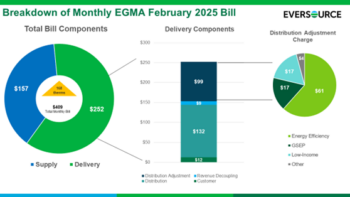
Unlike other energy costs, efficiency is the only investment that is required to pass cost-effectiveness testing. In fact, overall system costs would be billions of dollars greater without the cost reductions secured with efficiency; the more the benefits of improved energy efficiency are reduced, the costlier our energy system becomes.
Figure 7: Benefits of Current Three-Year Energy Efficiency Plans by State (source: Acadia Center)
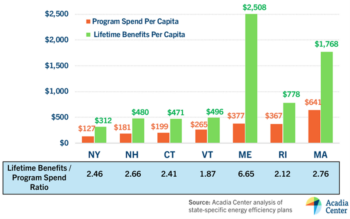
We should be investing even more to give homeowners, renters, and small businesses more tools to control their energy use and utility bills by increasing access to energy efficiency and implementing time-of-use (TOU) rates, plus expanding offerings for demand response and battery storage – which serve as far more cost-effective solutions for peak demand periods than the enormously costly reliability-must-run (RMR) contracts with fossil fuel power plants that ratepayers have had to bear in recent years. Increased oversight and accountability of utility distribution costs can also help drive savings for ratepayers, including via performance-based regulatory approaches to reduce inefficiencies and align incentives.
Looking back over time, the enormous benefits of the region’s energy efficiency benefits are self-evident. They have provided, as recently as 2023, 15% of gross electricity load for the entire region over the course of the year. In this way, energy efficiency helps meet the energy needs of our grid much in the same way as traditional supply resources like gas, oil, and coal. At the end of the day, the lowest-cost source of electricity is the one we never use.
Figure 8: Historic Benefits of NE Energy Efficiency Programs, 2012-2023 (source: Acadia Center)
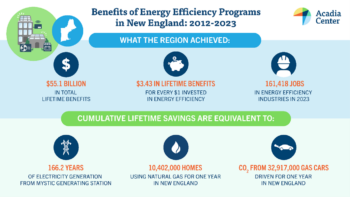
[1] https://www.nbcboston.com/weather/stories-weather/boston-total-snowfall-this-winter/3636399/
New report finds that improved community engagement for clean infrastructure projects is critical to New England’s energy transition
Download the Press Release: EATS Report Press Release
Full Report: The Energy is About to Shift
Webinar:
Webinar PowerPoint: Energy is About to Shift Webinar
Media Contacts:
Samantha Beairsto
Deputy Director, Communications and Development,
Acadia Center
sbeairsto@acadiacenter.org, 617-742-0054 x109
Natalie Volk
Communications Manager
Clean Air Task Force
nvolk@catf.us, 703-785-9580
BOSTON – A new report released today by Acadia Center and Clean Air Task Force (CATF) reveals that enhanced community engagement for clean energy infrastructure projects is critical to achieving New England’s 2050 decarbonization goals. The report highlights the opportunity to accelerate the region’s clean energy progress by addressing local concerns and better equipping communities to meaningfully participate in siting and approval processes. Drawing from prominent case studies around the region, the report also identifies promising options for developers, communities, and policymakers to improve project planning and engagement, helping reduce the risk of failures, legal challenges, and delays. Without comprehensive reforms to improve community engagement processes and modernize siting and permitting policies, the region’s clean energy transition risks significant delays and setbacks.
“Our research shows that when community concerns are not taken seriously, community opposition and distrust can grow, leading to extended project timelines, higher costs, and resistance to future clean energy projects,” said Nicole Pavia, Director of Clean Energy Infrastructure Deployment at CATF. “Whether it’s rural, urban, or suburban communities, community engagement isn’t just a box to check — it’s an essential part of New England’s clean energy future. When communities are meaningfully engaged, we see stronger projects that deliver clean energy benefits while fostering trust, local economic growth, and long-term support for future projects.”
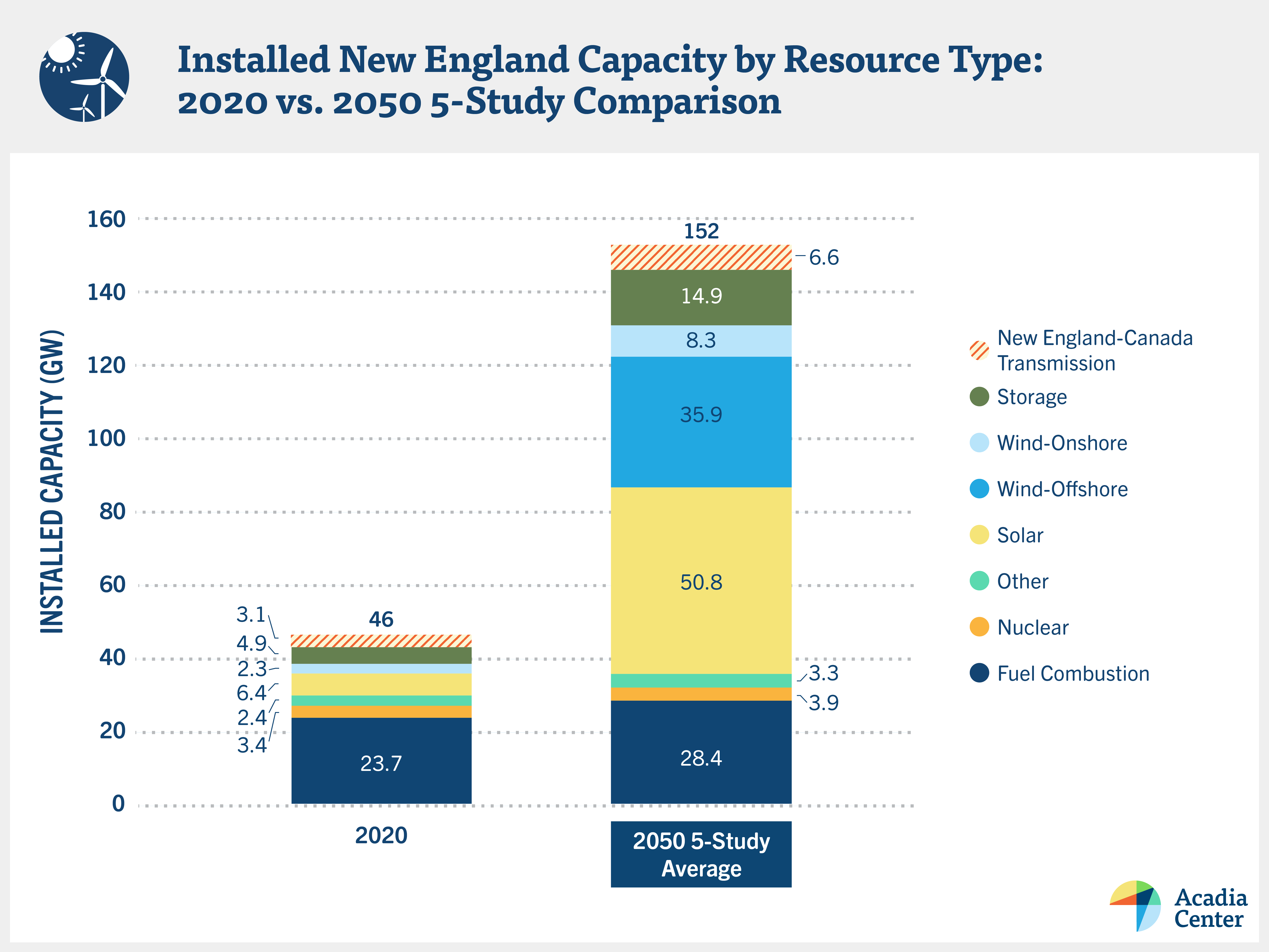
The report includes a comprehensive review of five key studies outlining cost-effective, electrification-focused pathways to decarbonizing New England’s grid and energy systems. The scenarios analyzed reveal that in the 2030s, peak demand for electricity in the region will shift from summer to winter. By 2050, peak demand for electricity is expected to double from 27 gigawatts (GW) to 55 GW, driven largely by the electrification of vehicles and proliferation of heat pumps. To meet the demands of the energy transition, generation capacity in the region will need to more than triple from 43 GW to 145 GW of installed capacity on average, led by increases in solar and offshore wind and aided by transmission system enhancements. Additionally, the report analyzes the diverse portfolio of energy technologies and approaches needed for the future grid – from transmission and generation to energy storage and demand-side resources such as energy efficiency and load flexibility – to maintain reliability, affordability, and resiliency.
“The energy transition will touch all 1,300+ communities in New England, and the region needs a new paradigm for infrastructure siting and engagement that gives those communities a meaningful voice even as the build-out of renewable energy and grid infrastructure accelerates,” said Jamie Dickerson, Senior Director, Climate and Clean Energy Programs at Acadia Center. “The region’s communities and people are at the center of its energy transition just as much as the grid itself is, underscoring the imperative of delivering real community benefits and shifting the environment of engagement toward a virtuous cycle of improved social standing and acceptance.”
The report also examines the challenges and friction points that often hinder positive clean energy development and shape communities’ posture as potential hosts for clean energy projects. Through interviews with stakeholders representing a range of interests – renewable energy developers, state regulators, local community leaders, and more – the report offers a behind-the-scenes look at the real-world factors influencing community support and responses. Case studies highlight key siting and engagement examples in the region, including:
- Vineyard Wind in Massachusetts
- King Pine Wind and Aroostook Renewable Gateway in Maine
- East Eagle Substation and Cranberry Point Energy Storage in Massachusetts
- Johnston Winsor Solar III in Rhode Island
- Twin States Clean Energy Link transmission line between New Hampshire and Vermont
The report outlines actionable options and opportunities state and local governments, project developers, and community stakeholders may take to improve public support for and expedite the deployment of clean energy infrastructure with impactful community benefits. These options are coming into clearer focus as some states in the region have very recently considered and enacted reforms to state siting and permitting laws in 2024, including most notably in Connecticut and in Massachusetts, where lawmakers passed a wide-ranging climate bill anchored around a significant overhaul of the state’s siting and permitting framework.
As these states and the New England region transitions away from fossil fuels to a decarbonized grid, success will depend on active and meaningful community engagement. Without local buy-in, critical clean energy projects will continue to face significant headwinds and delays, putting the region’s climate goals at risk.
On December 5, Acadia Center and CATF will host a webinar to discuss key findings from the report. Read the full report here and register here.
About Acadia Center
Acadia Center is a non-profit organization with over 25 years of experience dedicated to advancing transformative clean energy solutions that promote a livable climate and a more equitable economy in the Northeast United States and beyond. Through rigorous data analysis and strategic partnerships, Acadia Center advocates for policies that significantly reduce carbon emissions and address systemic energy challenges. By collaborating with governments, industries, and communities, Acadia Center’s bold strategies help to ensure an inclusive and sustainable energy future for all.
About Clean Air Task Force
Clean Air Task Force (CATF) is a global nonprofit organization working to safeguard against the worst impacts of climate change by catalyzing the rapid development and deployment of low-carbon energy and other climate protection technologies. With 25 years of internationally recognized expertise on climate policy and a fierce commitment to exploring all potential solutions, CATF is a pragmatic, nonideological advocacy group with the bold ideas needed to address climate change. CATF has offices in Boston, Washington D.C., and Brussels, with staff working remotely around the world.
Acadia Center Offers Rebuttal to Key Points in Flawed Analysis on New England Energy Policies and Costs
Download Press Release: Acadia Center Offers Rebuttal to Key Points in Flawed Analysis on New England Energy Policies and Costs
MEDIA CONTACT:
Kyle Murray
Director, State Program Implementation
kmurray@acadiacenter.org, 617-742-0054 ext.106
Today, a new report entitled “The Staggering Costs of New England’s Green Energy Policies” – released by The Massachusetts Fiscal Alliance, Maine Policy Institute, Josiah Bartlett Center for Public Policy, Rhode Island Center for Freedom and Prosperity, Ethan Allen Institute, Yankee Institute, and Americans for Prosperity Foundation – presents a deeply flawed analysis and distorted view of the region’s future energy outlook. The report, which was conducted by Always on Energy Research (AOER) “concludes that if every New England state maintains their green energy mandates, it will double electric rates and cause rolling blackouts in the region.” Always on Energy Research describes itself as “a policy group dedicated to ensuring that every state in America has affordable, reliable energy.” Their staff have current or past affiliations with groups such as the John Locke Foundation, the American Petroleum Institute (API), the State Policy Network (SPN), and the Center for the American Experiment.
Their analysis and conclusions fail to stand up to even the most basic scrutiny, which is also the case for the related “analysis” and messaging put forward by the Massachusetts Fiscal Alliance in a Commonwealth Beacon OpEd earlier this month – which, based on Acadia Center analysis, overestimated the annual cost of a recently enacted energy storage policy in Massachusetts by more than 25x to 30x, as detailed further below. It is incredibly unfortunate that this report continues to rely upon similar ill-informed assumptions and questionable calculations to vastly inflate the cost of the energy transition by multiple factors.
Breaking Down Misleading Calculations on Energy Storage
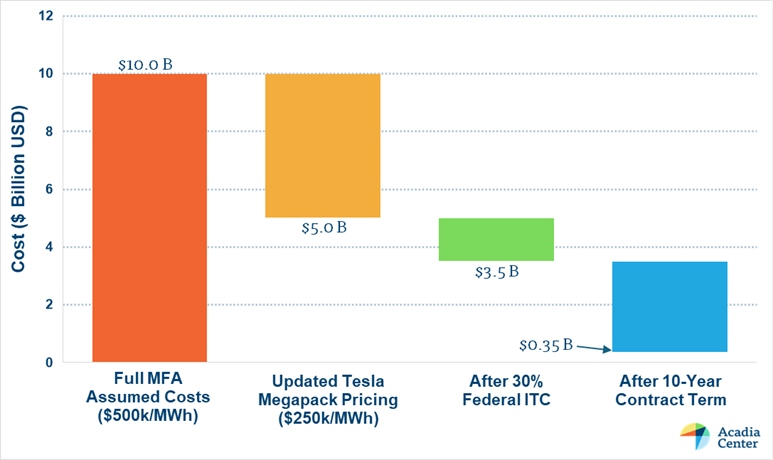
The press release for the AOER report states that “the cost of reducing carbon dioxide emissions under these plans exceeds the benefits of doing so, meaning the New England states are imposing a net harm on their economies after accounting for the financial impacts of climate change.” This characterization could not be further from the truth, and in fact fails to recognize the once-in-a-generation opportunity that New England has: to redesign and revolutionize its energy system and localize the job-creation and GDP impact of energy expenditures within the regional economy rather than export them afar.
Furthermore, the AOER analysis ignores the impossibly high cost of business-as-usual. New Englanders withdraw billions of dollars out of the regional economy each year to purchase fossil fuels sourced outside New England. Vermont, New Hampshire, and Maine alone spend $8.2 billion annually importing fossil fuels. The cost of ignoring the climate crisis is fast becoming incalculable: in 2023 alone, the United States experienced a record-setting 28 separate weather and climate disasters costing at least $1 billion, totaling a cumulative $92.9 billion. The cost of those disasters was also tallied in human lives. This underscores the clear and imminent risk that this region and the nation at large face by not taking the climate crisis seriously. Anything less than urgent action on energy and climate issues is fiscally imprudent and threatens to leave New England families and businesses exposed to both the much larger, hidden costs of unabated climate change as well as the billions of dollars of fossil fuel infrastructure operating today and facing stranded-asset risk.
Let’s be candid: there will be significant costs from the energy transition (and significant benefits as well) – Acadia Center has been clear-eyed about this reality and what it means for our public policymaking. However, using intentionally misleading information to fearmonger on behalf of the fossil fuel industry and advance its interests does not serve the best interests of New England ratepayers. Furthermore, the fact that the region’s GDP has grown while it simultaneously bends the curve on carbon emissions belies the canard that New England state climate policies spell doom for the regional economy. We can address the climate crisis while growing the regional economy and preserving the region’s prosperity. That much has been proved. We look forward to engaging with policymakers and stakeholders constructively on these important public policy debates with a shared set of facts and sound analysis.
Acadia Center presents the following point-by-point rebuttal of several erroneous and misleading claims put forward by the report:
Claim #1 Made by AOER Report: Compliance with the New England Decarbonization Plans would cost $815 billion through 2050
Acadia Center Response #1: The AOER analysis suggests an annual average of $31.3b per year over 26 years (2024-2050). In 2022, the six New England states spent $76b on total energy under the status quo/‘business as usual’ approach. Even if the AOER figures were sound – and they are not – it would be vastly preferable to invest $31.3b per year on clean energy in our region rather than spend the majority of $76b per year on fossil fuels from outside the region, as our current energy system does. In analysis undertaken by Massachusetts, findings showed that the total cost increase of a representative mitigation pathway in 2050 ($1.5 billion annual spending) compared to a non-decarbonized reference case in 2050 was actually less than the expected increase in statewide energy costs resulting from population and economic growth ($2.4 billion annual spending). Finally, the AOER analysis also expressly excludes the impact of federal tax credits, omitting a huge source of likely ‘cost-share’ from the federal government that will make the transition even more affordable for ratepayers.
Claim #2 Made by AOER Report: Residents and businesses can expect electricity rates to double…New England families would see their electric bills increase by an average of $99 per year.
Acadia Center Response #2: Previous extensive modeling conducted by Massachusetts for the Commonwealth’s ‘2050 Decarbonization Roadmap’ and Clean Energy and Climate Plans (CECP) provide evidence for a much different trend for regional energy prices in the coming decades. These studies included granular region-wide energy system modeling to arrive at their results for Massachusetts customers.
- The Roadmap found: “Rates increase out to 2030, then decrease in the subsequent 20 years…. After 2030, growth in electricity load, and vehicle electrification in particular, allows for a reduction in the per‐unit cost of wires on the system,” including thanks to flexible EV charging adding load at night and increasing the load factor in all parts of the system.
- The 2025/2030 CECP found: “The increased adoption of electrified transportation and heating systems means that the average Massachusetts household will spend less money on energy every year. Average overall household energy expenditures, which include transportation-related fuel costs (included as “energy” cost in this analysis), are projected to decline 8% by 2030 relative to 2019 levels, for an average household savings of $400 per year.”
- The 2050 CECP found: “the efficiency gains of electrification will result in lower household energy expenditures through 2050 (monthly bills for electricity and fuels). Transportation and household-related electricity and fuel expenditures are projected to decline by roughly 13% between 2030 and 2050, representing an average of nearly $600 (in 2021 dollars) in 2050 compared to 2030.
Claim #3 Made by AOER Report: The cost of reducing carbon dioxide emissions under these plans exceeds the benefits of doing so.
Acadia Center Response #3: Pathways that invest in local energy resources, including renewable electricity generation and energy efficiency, create more jobs and demonstrate greater economic benefits by keeping money local compared to pathways more reliant on imported energy. For example, the “All Options” pathway from the Massachusetts 2050 Decarbonization Roadmap Study Economic and Health Impacts Report (which emphasized deep electrification and broad renewable electricity buildout) had 17% higher economic “output” (the broadest measure of economic activity) in Massachusetts per dollar invested than the “Pipeline Gas” pathway (which relied heavily on imported alternative fuels). Evidence of these benefits in action is highlighted throughout state clean energy industry reports conducted regularly, such as in Massachusetts, where in 2022, the industry contributed over $14b to Gross State Product, and in Maine, where the clean energy economy now accounts for over 2% of the state’s total workforce, more than 15,000 jobs.
Claim #4 Made by AOER Report: ISO-New England may be unable to coordinate electricity to power the region within 11 years. [Green energy mandates will] cause rolling blackouts in the region.
Acadia Center Response #4: ISO-NE’s own extensive analysis on reliability and resource adequacy have found no such imminent threats to the region’s grid. To the contrary, earlier this year, the largest fossil fuel generating facility in the region (Mystic Generation Station in Everett, MA) was allowed to safely retire without reliability issues, enabled by low-lost local transmission upgrades. Furthermore, findings from ISO-NE’s Probabilistic Energy Adequacy Tool (PEAT) and Regional Energy Shortfall Threshold (REST) workstreams indicate that, in the near-term, the winter energy shortfall risk “appears manageable” over a critical 21-day winter cold-snap period that was the main subject of the analysis. Examination of worst-case scenarios in 2032 indicated an increasing shortfall risk profile in the back half of this decade (2027-2032); however, ISO-NE’s core findings hold true: “Timely additions of behind-the-meter and utility-scale solar, offshore wind, and incremental imports from New England Clean Energy Connect (NECEC) are critical to mitigate energy shortfall risks that result from significant winter load growth and retirements.” In other words, new clean energy is proving vital for reliability and keeping the grid’s peaks manageable. New procurements of energy storage resources (also the subject of questionable analysis, highlighted further below) will also materially improve the resource adequacy and reliability conditions as those resources come online in the years ahead.
Stepping back, “change” has been the sole constant for electric grids since their inception. For example, the US electric power sector delivered 329 terawatt hours (TWh) of electricity in 1950 and 4,090 terawatt hours of electricity in 2022: a 12.4x increase. But dramatic growth alone does not account for all the notable changes to the grid. Due to increasing rates of energy efficiency, the nation is producing more goods and providing more services with improved efficiency, constituting a notable decoupling of GDP growth and electricity consumption. In other words, as dramatic as the growth of the electric grid has been over the last 70 years, that growth has been moderated by cost-effective energy efficiency. There are ample more opportunities to realize such savings from energy efficiency in the years ahead.
Claim #5 Made by AOER Report: Powering New England without interruption during a year in which wind and sunshine are plentiful would require 225 gigawatts (GW) of renewables
Acadia Center Response #5: Acadia Center analysis of five recent leading studies of deep decarbonization in New England identified an average of 150 GW of installed capacity by 2050, including only 95 GW of solar and wind – backed by storage, increased interregional transmission, nuclear capacity, and some remaining combustion resources. See graphic below from the forthcoming Acadia Center analysis, being released in the next week (stay tuned for more).
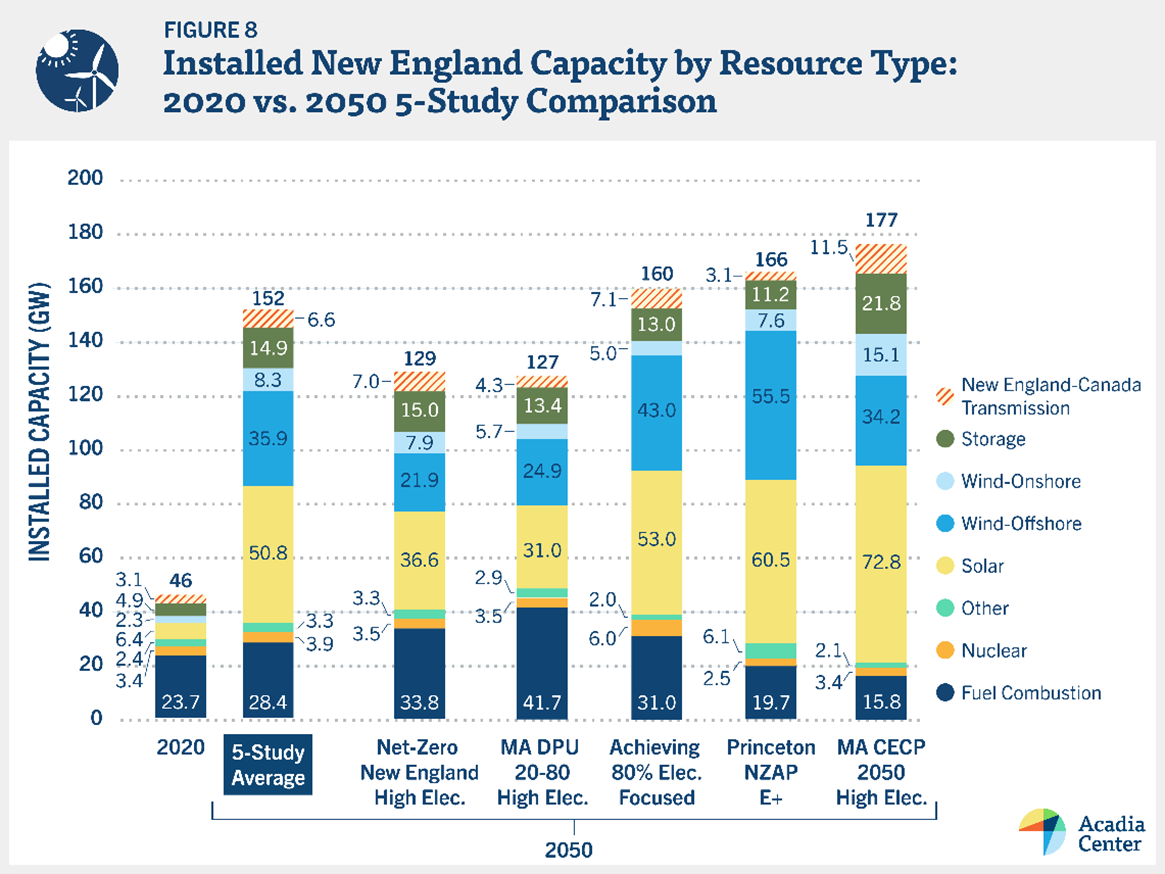
Claim #6 Made by AOER Report: New England is responsible for less than 0.4% of global emissions; it is unclear just how much cleaner the environment will become in exchange for the costs that have been imposed on the region and its people
Acadia Center Response #6: Given the enormous benefits to be reaped from economic output and avoided health care costs, it would be preferable for the region to pursue a low-carbon economy even if climate change were not a global crisis. But the latter is also true, and so it is doubly important for the region to do its part to participate in coordinated global action to reduce carbon emissions. Even the full U.S. as a whole only represents about 13.5% of global emissions – should the largest economy in the world therefore also cease all climate mitigation activities since it can’t solve the global crisis through its own actions? Clearly not. Finally, again, the region has so many engines of clean economic activity coming out of its universities, research laboratories, startup incubators, and beyond, whose full economic opportunity lies in the much more vast work of decarbonization that must occur outside this region. If New England can help prove the case for the cost-effective application of their technologies here, then the world’s energy markets will be theirs to conquer next – and all global citizens will benefit while the New England economy grows.
Claim #7 Made by AOER Report: Battery systems today run around $500,000 per megawatt hour, which yields a total cost of $10 billion, which equals roughly 17 percent of the current state budget (from Commonwealth Beacon piece).
Acadia Center Response #7: The cost of a four-hour “megapack” battery pack from Tesla is publicly available, and it reveals a dramatically lower cost of approximately $250,000/MWh. A 30% federal investment tax credit (ITC) is also available to battery storage projects of this nature. Furthermore, the legislation in Massachusetts requires utilities to enter into cost-effective long-term contracts for storage services, not to purchase storage systems and pay for them outright in one year. Spreading out the systems’ remaining costs over ten years reveals an annualized cost of approximately $350M, or 3.5% of the $10b price tag found by MFA. (See graphic above for more detail illuminating their substantial overestimate of >25-30X.) Even this still overstates the annual cost that would be borne by ratepayers, since contracts would be for only a portion of the full system costs, and since this analysis says nothing about the savings ratepayers would reap by using storage to mitigate the costly and dirty peaks on the grid today. Their discussion also completely ignores numerous cost-control mechanisms directly embedded in the approval process, including the directive to the D.P.U. to ensure contracts are cost-effective, meaning benefits to ratepayers exceed costs incurred.
Acadia Center Applauds Massachusetts Lawmakers and Governor Healey for Passage of Vital Climate Bill, Inclusion of Key Provisions Regarding Siting, Gas Reform, and More
For Immediate Release
November 14, 2024
MEDIA CONTACTS:
Kyle Murray, Director, State Program Implementation
kmurray@acadiacenter.org, 617-742-0054 ext.106
Jamie Dickerson, Senior Director, Climate and Clean Energy Programs
jdickerson@acadiacenter.org, 401-276-0600 x102.
Download Press Release: Acadia Center Press Release 2024 MA Climate Bill
BOSTON — Today, the Massachusetts Legislature enacted a momentous piece of climate legislation that reforms the siting and permitting of clean energy projects, limits natural gas expansion, sets ambitious electric vehicle charging standards, makes needed changes to clean energy procurement, and contains many other reforms that will help drive the Commonwealth forward on decarbonization. Acadia Center applauds the Legislature and the Governor for the leadership demonstrated in shepherding this impactful package of laws to enactment, and urges the Governor to sign this critical legislation as soon as possible. Through the bill package, the Legislature and the Healey-Driscoll Administration are taking tangible steps to drive the Commonwealth’s clean energy future forward in the wake of the federal Election outcome.
Acadia Center is proud to have played an advocacy role in helping build support for a strong package while simultaneously holding the line on the need for a broader bill rather than a narrow package focused only on siting/permitting. The organization stands ready and willing to work with agencies and stakeholders to implement the legislation’s directives, with an emphasis on protecting those who may be most affected by these elements of the broader energy and climate transition. This includes low-income and environmental justice communities, as well as the Commonwealth’s important gas workforce, all of whom deserve a just and equitable transition through the subsequent steps that will now unfold. With these protections identified and prioritized, Acadia Center believes this legislation presents bold yet thoughtful and common-sense changes that will maintain the Commonwealth’s leadership on climate.
Daniel Sosland, President at Acadia Center, said, “The climate crisis has shown itself to be unrelenting in 2024, leaving no room for inaction on policy at the local and state level. Thankfully, legislative leaders in Massachusetts answered the call, ensuring that the Commonwealth will remain a leader on clean energy and retain the momentum of reforms in key areas like infrastructure siting, gas system transition, and beyond. Acadia Center congratulates Chairs Michael Barrett and Jeffrey Roy, along with Governor Maura Healey, for reaching this week’s historic agreement, and we applaud the persistence and creativity shown in working towards a strong final package after the formal end of session. As the focus now shifts to implementation and regulatory action, residents and businesses across the Commonwealth—and even around the region—will begin to see tangible, quality-of-life benefits flowing from improvements to affordability, energy security, grid strengthening, extreme weather resilience, air quality and public health, and job creation and economic development.”
Kyle Murray, Director, State Program Implementation at Acadia Center, said, “Today’s agreement is a major win for the Commonwealth, for ratepayers, public health, climate resiliency, and for our clean energy future. These improvements to modernize siting and permitting processes will help deliver the infrastructure necessary for our electrified and zero-emission future in a way that preserves meaningful community standing and input. Further, the common-sense provisions to limit the growth of the sprawling natural gas system will provide the Department of Public Utilities (DPU) with the needed tools to save ratepayers money on imprudent investments, stranded assets, and leaky pipes. Both branches deserve tremendous credit for a visionary agreement that charts a responsible path forward.
Acadia Center and other advocates were initially deeply troubled when the legislature failed to come to an accord on a climate omnibus before the July 31st deadline for formal sessions. However, we were encouraged by information that the conference committee remained hard at work. Today’s outcome shows that faith has been rewarded with a powerful and balanced bill.
In the legislative agreement reached, the Legislature and Governor came together on a number of directives that will now shape the Commonwealth’s decarbonization pathways, including the following highlights:
- Siting and Permitting:
- Expands/updates Energy Facilities Siting Board (EFSB) authority, including setting a fixed time limit on decision appeals;
- Ensures a smoother path to approval for clean energy projects with a streamlined process;
- Adds a significant definition for cumulative impact analysis; and
- Creates an EFSB and DPU Intervenor Support Fund to provide citizens resources to intervene in these proceedings.
- Gas System Transition:
- Reforms the state’s Gas System Enhancement Plan (GSEP) process to allow for the retirement of pipes instead of simple repair or replacement.
- Ends the unilateral obligation to provide gas service and allows for alternatives to be considered;
- Allows the DPU to consider emissions when reviewing petitions to expand gas company territory;
- Changes the legal definition of a natural gas utility to give them license to deliver geothermal power, a possible first step in changing the business model of natural gas utilities; and
- Requires gas utilities to quantify the costs of potential stranded assets and the benefits of avoiding exposure to such assets.
- Grid-Enhancing Technologies (GETs) and Advanced Transmission Technologies (ATTs)
- Includes suite of provisions to advance the adoption of GETs and ATTs such as dynamic line ratings (DLR) on the Massachusetts power grid
- Incorporates ATTs/GETs into updated definition for transmission/distribution infrastructure under revised siting and permitting/EFSB regime
- Requires utilities to conduct analyses and develop timetables for the adoption of cost-effective GETs/ATT investments, and permits them to propose performance incentive mechanisms (PIMs) to reward progress on these investments.
- Incorporates ATTs/GETs into the prudence requirement utilities must meet for all Electric Sector Modernization Plan (ESMP) investments
- Directs the DPU and DOER to initiate an independent investigation of GETs/ATTs to monitor industry developments and clarify open jurisdictional questions.
- Procurement of Energy Storage, Offshore Wind, and Nuclear:
- Includes language promoting the development of battery storage facilities;
- Tweaks the current regulatory process for procuring offshore wind;
- Allows the state to negotiate power contracts lasting 30 years instead of the current 20 years for offshore wind and battery storage projects;
- Redefines clean energy under Massachusetts law to include power from existing New England nuclear plants – Millstone, based in Waterford, Connecticut, and Seabrook Station, in Seabrook, New Hampshire; and
- Extends renewable energy eligibility to fusion energy if and when it becomes a reality.
- EV Charging:
- Sets EV charger efficiency standards;
- Makes significant changes to the Electric Vehicle Infrastructure Coordinating Council (EVICC), including adding responsibilities for medium- and heavy-duty vehicles providing overall EV leadership/direction;
- Requires the DPU to investigate pole-mounted chargers to implement them more broadly; and
- Removes barriers to EV chargers in condo associations.
- MassPort Charter:
- Changes the MassPort charter to require consideration of greenhouse gas emissions and environmental justice.
While this legislation takes a number of meaningful steps forward, unfortunately the branches were unable to come to a compromise on some key issues that were in either the House or Senate versions of the bill.
- Other important climate/environment elements not included:
- Retail electric supplier ban as a measure for consumer protection
- Expansion of the state’s bottle deposit law
- Commuter rail electrification
- Removing biomass from the Municipal Light Plant Clean Energy Standard
Acadia Center looks ahead with excitement to the opportunity to carry this important work forward and implement the provisions of this historic legislation in keeping with the imperatives of climate, affordability, equity, safety and reliability, and beyond. The organization offers its gratitude to legislative and executive branch officials for their leadership in reaching this important conclusion.
Acadia Center Releases Findings on Regional Greenhouse Gas Initiative (RGGI) Offering Insights into the Allocation of Program Proceeds and Equity Investments
Full Report: Acadia Center RGGI Funds in Action
For Immediate Release
For Release: November 13, 2024
Media Contact:
Paola Moncada Tamayo
Policy Analyst
860-246-7121 x204; 305-504-9720 cell
Program model demonstrates continued impact and the importance of regional, multi-state action and cooperation in wake of federal election outcome.
RGGI Improves Reporting Related to Proceeds Investments Benefiting Environmental Justice Communities but Still Leaves Room for Improved Transparency and More Rapid, Equitable Investment of Program Funds.
Boston, MA – As participating states continue to undertake the Third Program Review of the Regional Greenhouse Gas Initiative (RGGI), Acadia Center today released a report titled RGGI Funds in Action: Insights into the Allocation of RGGI Proceeds, analyzing the investment of RGGI proceeds to date and offering recommendations for improving the process by which future funds are invested. In the wake of the federal election results, the report highlights the continued importance of cooperation at the sub-national level and validates the ongoing benefits that RGGI investments are driving, representing a model for durable multi-state collaboration. The report also examines in detail the first-ever data released jointly by the RGGI states on progress regarding the distribution of investments – totaling 30% – benefitting underserved and environmental justice (EJ) communities, demonstrating some progress but important remaining work to increase equity and improve transparency.
“This report provides more evidence for what Acadia Center has long believed to be true: regional and multi-state action on climate can have real impact. This is more important now than ever. The report’s analysis also shows that the benefits of the RGGI program extend far beyond power plant emissions reductions through the reinvestment of program proceeds into efforts driving clean energy, saving energy, and easing energy burdens,” said Daniel Sosland, President of Acadia Center. “Even as RGGI continues to drive significant benefits, there are still significant improvements to be made to drive greater equity and transparency in the investment of program proceeds. Acadia Center commends the RGGI States for new reporting in this regard and encourages them to go even further to maximize program impact and make a strong case for continued multi-state and regional action.”
“The most recent 2022 RGGI Proceeds Report released by RGGI Inc. in summer of 2024 made a significant advancement in transparency by providing a breakdown of investments directed toward EJ communities for the first time,” said Ben Butterworth, Director, Climate, Energy, and Equity Analysis, at Acadia Center. “Based on the summation of individual state reporting, the RGGI, Inc. report estimates that EJ and equity investments totaled approximately 30% of all RGGI proceeds invested by participating states in 2022. Acadia Center has been calling on RGGI, Inc. to include this data for several years, and we commend RGGI, Inc., and the RGGI states on this initial effort to present this critical data, which can help inform and set the stage for continued equitable investment strategies across the region.”
Notwithstanding this improvement in high-level reporting of RGGI proceeds investments directed at EJ communities, the Acadia Center Report also found that both RGGI, Inc., and the RGGI-participating states can improve the quality of RGGI proceeds investment reporting. In the future, more granular data should include a clear breakdown of who is receiving the proceeds, how funds are being allocated, and what measurable outcomes are being achieved for EJ communities and households across all participating states.
“The aggregated data on EJ investments lack granularity, including a breakout of EJ investment at the individual state level to determine whether each state’s approach aligns with the broader goals of EJ and effective use of proceeds,” pointed out Paola Tamayo, Policy Analyst, and primary analyst of the report. “We encourage RGGI, Inc., to build on its progress by providing more specific information on the categories for EJ funding, which will require the provision of more granular data from state agencies and program administrators responsible for allocating and deploying proceeds investments.”
Acadia Center recommends four key actions that should be taken by RGGI-participating states:
• Establish a requirement that a minimum of 40%-50% of RGGI proceeds are invested in EJ and other underserved communities, setting a value that does not change even if other RGGI funds are raided/diverted.
• Clearly articulate how EJ communities are being defined across all RGGI states and identify in greater detail how these definitions inform which investments are considered as equity and EJ-related.
• Invest in energy efficiency and other clean energy measures as soon as possible to avoid lengthy gaps between auctions and committed/realized investments, address existing energy burdens, and lock-in higher lifetime energy and emissions savings.
• Enhance transparency by publishing detailed breakdowns of proceed allocations going toward EJ and equity priorities for each state, including low-income households. This should be done from both RGGI, Inc.’s reports and state agencies’ reports on RGGI spending.
“Acadia Center’s report highlights how strategic and transparent management of RGGI proceeds is crucial to maximizing the program’s impact on emissions reductions and delivering benefits to underserved communities,” noted Dr. Mark Mitchell, Emeritus Professor of Climate, Energy, and Environmental Health Equity at George Mason University. “Implementing the recommended actions will enhance the effectiveness of the RGGI programs and promote greater accountability, transparency, and community engagement in the allocation of proceeds, building trust in the program and future policies that may emulate elements of the RGGI model.”
Larry Chretien, Executive Director of Green Energy Consumers Alliance, added, “We’ve known from the start that RGGI benefits everyone in the participating states. But there’s always room for improvement, and the Acadia Center report shows us how RGGI can do a better job of cleaning the air in EJ communities. This is an important contribution to the public’s review of RGGI.”
States should look to redouble their efforts in the wake of the election to continue strengthening RGGI while improving the program’s investments to benefit all residents. Acadia Center looks forward to working with the states, RGGI, Inc., and many partners in the coming months to finalize a strong Third Program Review and build on these improvements in the equity and transparency of program investments and reporting.
Additional facts about the benefits of the RGGI program:
1. Significant Emission Reductions: Since its inception, RGGI has successfully helped reduce CO2 emissions from the power sector by nearly 50%, which is 10% more than the 40 states that have not consistently implemented a price on greenhouse gas emissions (Acadia Center’s 2023 report).
2. Economic Benefits: RGGI has generated over $8.3 billion in auction proceeds that states have invested in energy efficiency, renewable energy, and other programs. These investments help create jobs, stimulate economic growth, and reduce energy costs for consumers. (RGGI Inc’s website).
3. Job Creation: RGGI investments have been associated with the creation of thousands of jobs in the clean energy sector. Since its inception, RGGI has created approximately 48,000 job-years (Analysis Group report).
4. Consumer Savings: Programs funded by RGGI proceeds have led to significant energy savings for consumers. In 2022, RGGI investments in energy efficiency are projected to save participants over $1.5 billion on energy bills (RGGI Inc’s most recent proceeds report).
5. Environmental Justice Focus: RGGI states are increasingly directing funds to support environmental justice initiatives. In 2022, 30% of the total RGGI proceeds were reported to be allocated to these initiatives (RGGI Inc’s most recent proceeds report).
###
Acadia Center is a nonprofit research and advocacy organization committed to advancing the clean energy future.
acadiacenter.org
New Webinar to Highlight Benefits of US-Canada Energy Exchange for Offshore Wind
FOR IMMEDIATE RELEASE: September 6, 2024
Contact: Samantha Beairsto, Acadia Center, sbeairsto@acadiacenter.org

BOSTON – September 6, 2024 – Acadia Center is proud to announce its collaboration with New England for Offshore Wind (@NE4OSW) and the Environmental League of Massachusetts on a webinar that will uncover the benefits of balancing US-Canada energy resources to bolster Atlantic offshore wind potential.
Bridging the Power Gap:
How Bidirectional Clean Energy Benefits the US Northeast and Eastern Canada
October 9, 2024 • 12:00 – 1:15 p.m.
Register tinyurl.com/587wvje8

As offshore wind takes a bigger role in decarbonizing the US Northeast, and Canadian provinces and utilities eye growing electricity demand, leaders on both sides of the border must think holistically about the benefits of greater two-way electricity trade. In this webinar, experts will explore how bidirectional flows and interregional transmission capacity can unlock synergies between Canada’s clean energy sources, both existing and new, and emerging clean energy resources in the Northeast – all in an effort to support fossil fuel phaseout, address regional climate goals, and ensure an affordable, reliable power grid.
Key Highlights:
- How expanding interregional transmission capacity can enable greater utilization of existing hydro reservoirs as a balancing resource, making greater and more efficient use of renewable energy resources across the border.
- Fresh perspectives on the changing market conditions in both the U.S. and Canada, especially as Canada undergoes a shift from abundance to potential scarcity.
- What new market conditions mean for the optimal bidirectional flow of electricity across the border between neighboring regions.
About Acadia Center
Acadia Center (AcadiaCenter.org) is a non-profit organization with over 25 years of experience dedicated to advancing transformative clean energy solutions that promote a livable climate and a more equitable economy in the Northeast United States and beyond. Through rigorous data analysis and strategic partnerships, Acadia Center advocates for policies that significantly reduce carbon emissions and address systemic energy challenges. By collaborating with governments, industries, and communities, Acadia Center’s bold strategies help to ensure an inclusive and sustainable energy future for all.
About ELM
The Environmental League of Massachusetts (EnvironmentalLeague.org) advocates for policy that meets the scale and urgency of our environmental challenges. ELM is the founding convener of New England for Offshore Wind (@NE4OSW), a broad-based coalition of environmental organizations, businesses and associations, academic institutions, and labor unions committed to combatting climate change by increasing the supply of clean energy to our regional grid through more procurements of responsibly developed offshore wind.
About New England for Offshore Wind
New England for Offshore Wind (NewEnglandforOffshoreWind.org) is a broad-based coalition of businesses and associations, environmental and justice organizations, academic institutions, and labor unions committed to combatting climate change by increasing the supply of clean energy to our regional grid through more procurements of responsibly developed offshore wind. We believe that responsibly developed offshore wind is the single biggest lever we can pull to address the climate crisis while also strengthening our regional economy, protecting ratepayers, creating high quality jobs, and improving public health by reducing pollution.
RGGI 64th Auction: An Additional $337 Million Raised for Clean Energy
BOSTON, MA – On Wednesday, June 5, 2024, the ten states participating in the Regional Greenhouse Gas Initiative (RGGI) released the results of the 64th auction 2024. Emissions allowances were sold for $21.03 each, generating $337 million for clean energy investments in participating states.
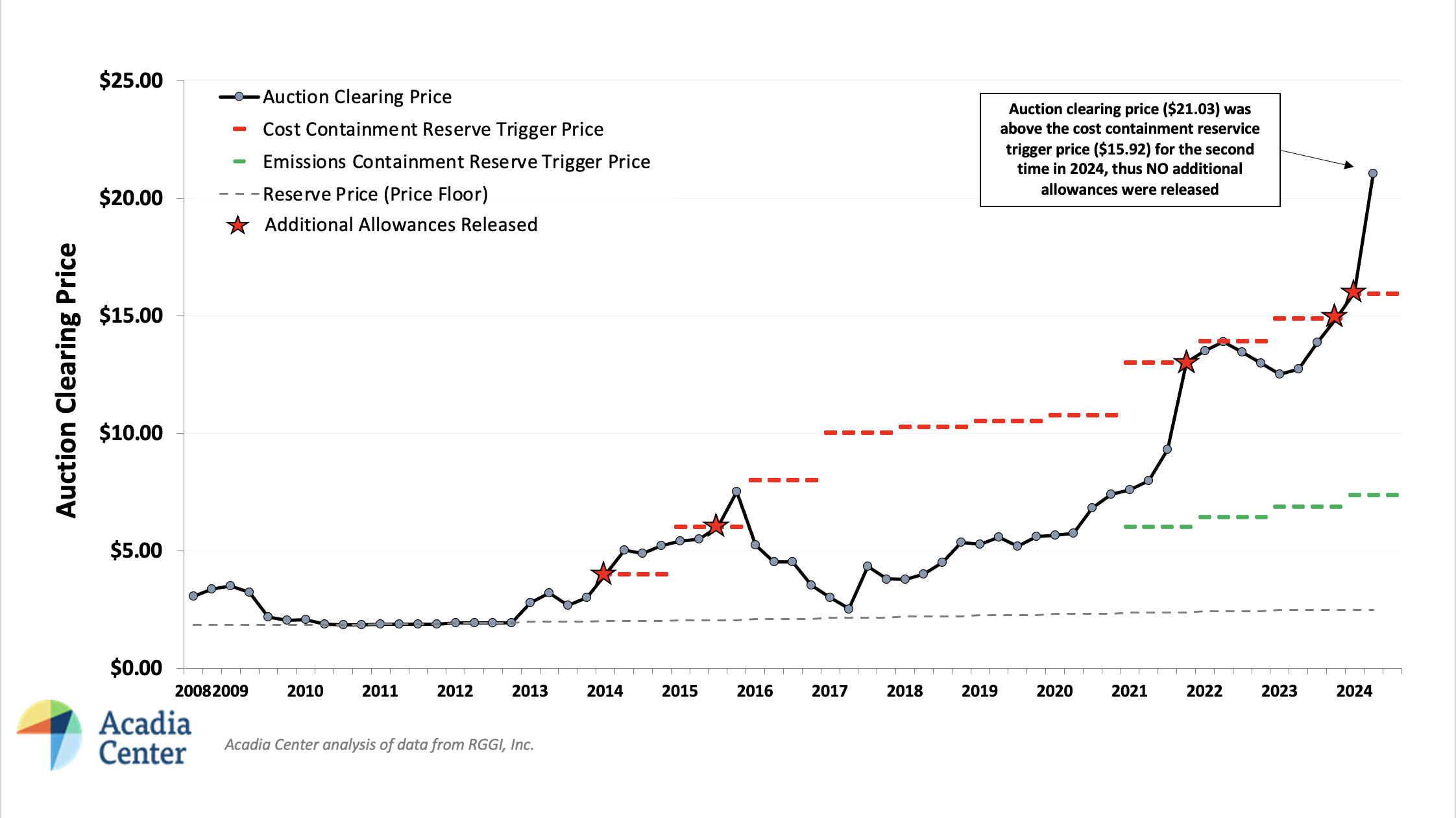
“The record-setting price in the 64th RGGI auction speaks volumes, it’s a reflection of the growing value in the collective effort to reduce carbon emissions —$337 million raised brings RGGI’s cumulative total to a staggering $7.8 billion since the inception of the program, and these newly generated funds will continue to invest in sustainable solutions and support the transition to a cleaner, more equitable energy future,” stated Paola Tamayo, Policy Analyst at Acadia Center and co-author of the organization’s RGGI Third Program Review Report.
The allowance price of $21.03 is the highest price observed historically since the RGGI program’s inception. RGGI auctions stand as a crucial mechanism for curbing carbon emissions and charging power plants for their climate pollution. Among the various instruments within RGGI auctions, the Cost Containment Reserve (“CCR”) – a market mechanism that releases extra allowances beyond the cap to be sold if prices exceed predetermined levels – was triggered for the second time in 2024. Since the CCR was triggered during the 63rd auction, all the CCR allowances for the 2024 calendar year have been released, so despite the 64th auction price meeting the threshold for triggering the CCR, there were no additional allowances released.
The CCR was initially conceived to be a safeguard, only to be triggered in times of extraordinary circumstances. Recent trends have shown a worrisome pattern: in the latest auction, the CCR was triggered for the third consecutive time. This pattern highlights the importance of reassessing the CRR trigger price in this Program Review. By raising the CCR cost, more breathing room is created for auction prices to rise, ensuring the effectiveness of the RGGI cap in reducing emissions.
Furthermore, the Emissions Containment Reserve (ECR) retains allowances for additional emissions reductions if prices fall below the trigger price of $7.35 in 2024. Notably, the ECR remains well below the auction price and has historically not been triggered. That means that the auction price is almost three times higher than the trigger price, signaling a significant deviation from the original intent of this program mechanism. For the ECR to maintain its effectiveness as a market stabilizer, it should show a more dynamic response to fluctuations in auction prices. While the ECR serves as a vital safety net, its rigid structure makes the effect of this mechanism negligible in the face of rising auction prices. As stakeholders engage in discussions surrounding the third program review, there’s a pressing need to reevaluate the mechanisms governing the ECR. By introducing greater flexibility and adaptability into its design, the ECR can better fulfill its role in ensuring the stability and integrity of the RGGI market, ultimately driving progress towards a more sustainable future.
Higher RGGI allowance price is good for climate, clean energy investment
The clearing price of $21.03 for the first auction of 2024 marks a continuation of the upward trend observed in recent years. This clearing price represents a 65% increase from the clearing price in Q2 of 2023 and a 31% increase from the last auction. The positive trajectory witnessed in the 2023 and 2024 auctions holds promising implications for the RGGI program. Higher observed allowance means that the RGGI program is sending a stronger incentive to reduce fossil fuel emissions and produce electricity from carbon-free sources, like wind and solar.
Since the program launched, the vast majority of RGGI proceeds have been invested in energy efficiency and clean energy projects, as detailed in the most recent report on RGGI investments in 2021, released in June of last year. We are also hoping for a more timely and transparent reporting system on proceeds investments. As the auctions generate significant revenue, it’s crucial to ensure that these funds are allocated efficiently and effectively towards clean energy and energy efficiency initiatives.
The $337.5 million in proceeds generated in this auction brings the cumulative to-date total to $7.89 billion. The 2023 and 2024 auction results underscore RGGI’s significance as more than a regulatory framework, emphasizing its influence on the shift towards sustainable energy. RGGI states show the practicality of a collaborative, market-driven strategy for reducing greenhouse gas emissions.
RGGI Third Program Review Offers an Opportunity to Direct Proceeds Towards Clean Energy Investments that Directly Benefit Environmental Justice Communities
Since its establishment, RGGI’s priorities have centered around reducing pollution from fossil fuel power plants and achieving climate solutions for RGGI states. Every five years or so, RGGI undergoes a program review, giving the participating states the opportunity to consider the program’s performance and make various changes, including the equitable disbursement of the program’s proceeds. RGGI’s Third Program Review is happening now, and we are still waiting for more information on what to expect from them this year. Especially since it was expected to conclude at the end of last year. In 2023, RGGI held two public meetings and two public comment periods to discuss and seek feedback on various aspects of the program. Acadia Center, other stakeholders, and the public at large await any responses from the states to public input on setting the cap and improving overall program design and operation.
As discussed in more detail in Acadia Center’s most recent RGGI Report, there are many different ways in which RGGI can ensure that environmental justice communities are heard and are actively involved in the development of strategies for an equitable transition to a carbon-free economy. Regardless of how strongly the Third Program Review does or does not prioritize environmental justice, it should remain a priority for individual states to consider the recent auctions, the history of investments across the states, the need to benefit environmental justice communities directly, and other mechanisms associated with the cap-and-invest program.
Acadia Center remains closely involved in RGGI policy conversations across the RGGI states and will continue to advocate for program reforms that drive equitable investment and climate action.
Media Contacts:
Paola Moncada Tamayo, Policy Analyst
ptamayo@acadiacenter.org, 860-246-7121 x204
Ben Butterworth, Director: Climate, Energy, and Equity Analysis
bbutterworth@acadiacenter.org, 617-742-0054 x111
RGGI 63rd Auction: An Additional $388 Million Raised for Clean Energy
FOR IMMEDIATE RELEASE
RGGI 63rd Auction: An Additional $388 Million Raised for Clean Energy
For Release: March 20, 2024
BOSTON, MA – On Wednesday, March 6, 2023, the ten states participating in the Regional Greenhouse Gas Initiative (RGGI) released the results of the 63nd auction for 2024. Emissions allowances were sold for $16.00 each, generating $388 million for clean energy investments in participating states.
“The strong success of this auction speaks volumes—$388 million raised brings RGGI’s cumulative total to a staggering $7.5 billion,” stated Paola Tamayo, Policy Analyst at Acadia Center and co-author of the organization’s RGGI Third Program Review Report.
The allowance price of $16.00 is the highest level observed historically since the RGGI program’s inception. RGGI auctions stand as a crucial mechanism for curbing carbon emissions and charging power plants for their climate pollution. Among the various instruments within RGGI auctions, the Cost Containment Reserve (“CCR”) – a market mechanism that releases extra allowances beyond the cap which are sold if prices exceed predetermined levels – was triggered again in this auction. The Trigger Price of $15.92 per ton of CO2 was met, and 8,416,278 CCR allowances were sold in the auction. The CCR was initially conceived to be a safeguard, only to be triggered in times of extraordinary circumstances. However, recent trends have shown a worrisome pattern: in the latest auction, the CCR was triggered for the second consecutive time. This auction highlights the importance of reassessing the CRR trigger price in this Program Review. By raising the CCR cost, more breathing room is created for auction prices to rise, ensuring the effectiveness of the RGGI cap in reducing emissions.
Furthermore, the Emissions Containment Reserve (ECR) retains allowances for additional emissions reductions if prices fall below the trigger price of $7.35 in 2024. Notably, the ECR remains well below the auction price and has historically not been triggered. That means that the auction price was over two times higher than the trigger price, signaling a significant deviation from the original intent of this program mechanism. For the ECR to maintain its effectiveness as a market stabilizer, it should show a more dynamic response to fluctuations in auction prices. While the ECR serves as a vital safety net, its rigid structure makes the effect of this mechanism negligible in the face of rising auction prices. As stakeholders engage in discussions surrounding the third program review, there’s a pressing need to reevaluate the mechanisms governing the ECR. By introducing greater flexibility and adaptability into its design, the ECR can better fulfill its role in ensuring the stability and integrity of the RGGI market, ultimately driving progress towards a more sustainable future.
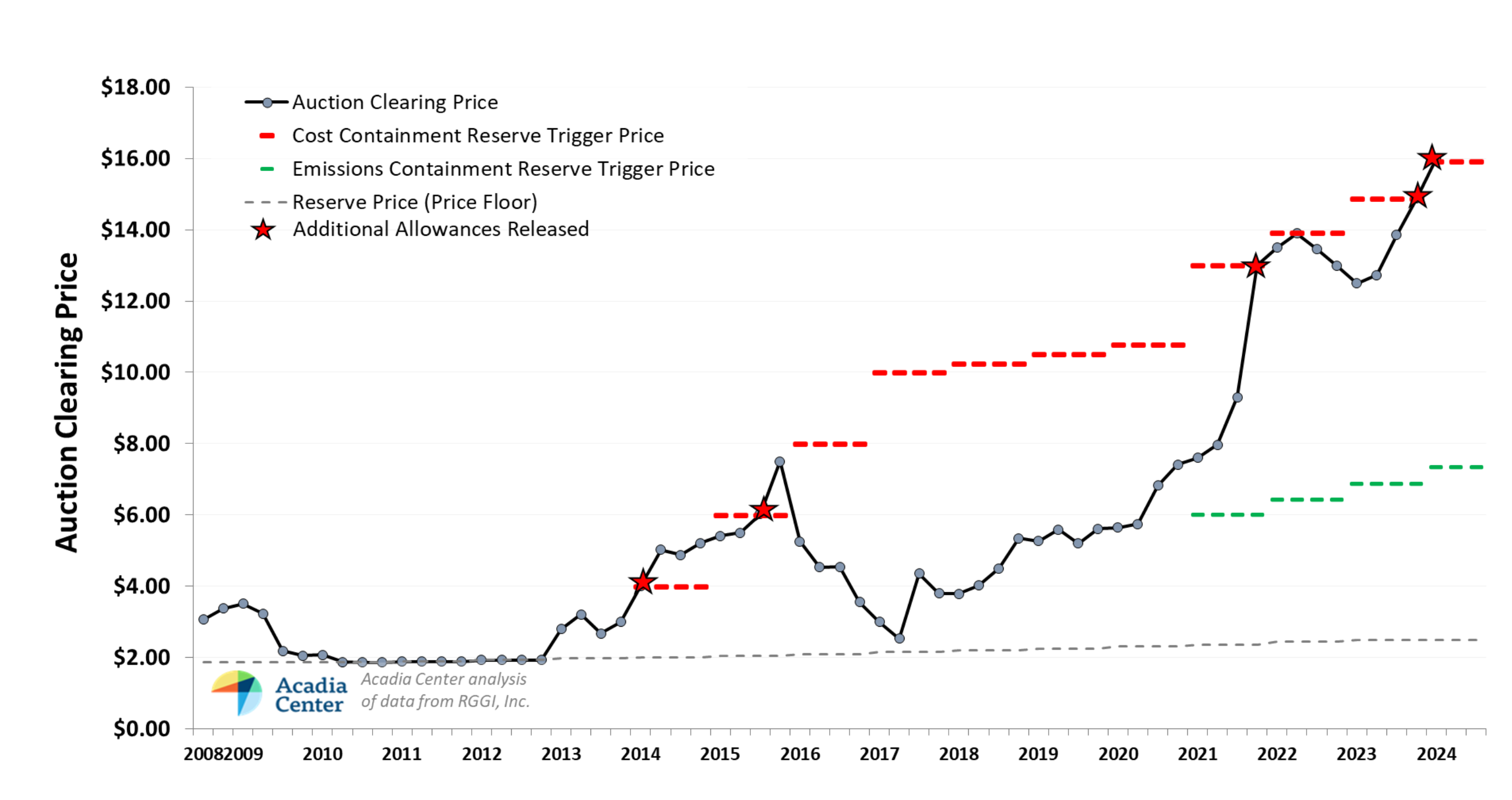
Higher RGGI allowance price is good for climate, clean energy investment
The clearing price of $16 for the first auction of 2024 marks a continuation of the upward trend observed in recent years. This clearing price represents a 28% increase from the clearing price in March 2022 and an 8% increase from the last auction. The positive trajectory witnessed in the 2023 auctions and this first auction of 2024 holds promising implications for the RGGI program. Higher observed allowance prices in 2022, 2023 and now 2024 means that the RGGI program is sending a stronger incentive to reduce fossil fuel emissions and produce electricity from carbon-free sources, like wind and solar.
Since the program launched, the vast majority of RGGI proceeds have been invested in energy efficiency and clean energy projects, as detailed in the most recent report on RGGI investments in 2021, released in June of last year. We are also hoping for a more timely and transparent reporting system on proceeds investments. As the auctions generate significant revenue, it’s crucial to ensure that these funds are allocated efficiently and effectively towards clean energy and energy efficiency initiatives.
The $388 million in proceeds generated in this auction brings the cumulative to-date total to $7.5 billion. The 2023 and 2024 auction results underscore RGGI’s significance as more than a regulatory framework, emphasizing its influence on the shift towards sustainable energy. RGGI states show the practicality of a collaborative, market-driven strategy for reducing greenhouse gas emissions.
RGGI Third Program Review Offers an Opportunity to Direct Proceeds Towards Clean Energy Investments that Directly Benefit Environmental Justice Communities
Since its establishment, RGGI’s priorities have centered around reducing pollution from fossil fuel power plants and achieving climate solutions for RGGI states. Every five years or so, RGGI undergoes a program review, giving the participating states the opportunity to consider the program’s performance and make various changes, including the equitable disbursement of the program’s proceeds. RGGI’s Third Program Review is happening now and is expected to conclude relatively soon this year. In 2023, RGGI held two public meetings and two public comment periods to discuss and seek feedback on various aspects of the program. Acadia Center, other stakeholders, and the public at large await any responses from the states to public input on setting the cap and improving overall program design and operation.
As discussed in more detail in Acadia Center’s most recent RGGI Report, there are many different ways in which RGGI can ensure that environmental justice communities are heard and are actively involved in the development of strategies for an equitable transition to a carbon-free economy. Regardless of how strongly the Third Program Review does or does not prioritize environmental justice, it should remain a priority for individual states to consider the recent auctions, the history of investments across the states, the need to benefit environmental justice communities directly, and other mechanisms associated with the cap-and-invest program.
Acadia Center remains closely involved in RGGI policy conversations across the RGGI states and will continue to advocate for program reforms that drive equitable investment and climate action.
Media Contacts:
Ben Butterworth, Director: Climate, Energy, and Equity Analysis
bbutterworth@acadiacenter.org, 617-742-0054 x111
Paola Moncada Tamayo, Policy Analyst
ptamayo@acadiacenter.org, 860-246-7121 x204
A Call to Action: Connecticut Climate Justice March and Acadia Center’s Support for 2024 Clean Energy Priorities
For Release: February 2, 2024
Download the Press Release: Acadia Center Press Release – 2024 Connecticut Climate Justice March
Hartford, CT – In the lead-up to the start of Connecticut’s 2024 legislative session, Jayson Velazquez – Acadia Center’s Climate and Energy Justice Policy Associate – today joined climate, energy, and environmental advocates, organizers, and activists in Connecticut’s Climate Justice March. In this call to action, participants and speakers called on legislators, officials, and organization leaders to take adequate action to address climate change.
In addition to the Climate Justice March, advocates, organizers, and activists issued a Climate Justice Letter with a detailed list of equitable solutions to align Connecticut with its emissions reduction targets outlined in the Global Warming Solutions Act (GWSA).
In addition to contributing to the list of solutions in this letter, Velazquez gave a speech during a stop on the Climate March in Hartford to highlight the pressing need to address energy inequities across the state.
Acadia Center expresses specific enthusiastic support for energy priorities outlined in the Climate Justice Letter:
• Operationalize Procedural, Distributive, Corrective, and Contextual Equity: Incorporate equity principles identified by the Governors’ Council on Climate Change (GC3) and the Connecticut Equity and Environmental Justice Advisory Council (CEEJAC) into Connecticut climate and energy plans.
• Increase Funding for, Identify, and Address Barriers to accessing Energy Efficiency Programs including the Home Energy Solutions Income Eligible (HES-IE) Program: Increase funding for efficiency programs to ensure maximum deployment of energy efficiency upgrades throughout the state, and ensure that adequate funding is devoted to workforce recruitment and training to ensure a robust energy efficiency workforce in Connecticut. The existing Community Partnerships Initiative could be leveraged to ensure barriers are identified, and solutions are collaboratively designed to provide increased access to energy efficiency programs.
• Expand Renewable Energy Deployment: Expand solar programs and establish targets for commercial, residential, and community solar projects, while addressing battery storage needs.
• Require Renewable Energy Sources on New Commercial and Industrial Construction: Support legislation to enable and incentivize municipalities to require renewable energy sources such as, geothermal, solar, heat pumps, etc., on new commercial and industrial construction.
• Heat Pump Deployment and Building Electrification: Invest in the electrification of newly constructed and existing homes. Support development of heat pump targets and financing programs, such as no-or-low interest loans for zero-emission heating equipment and necessary electrical upgrades to help support the transition to electric heat pumps and water heaters.
• Carbon Free and Healthy Schools: Support establishment of a $25 million CT Green Bank program to help schools implement energy saving and renewable energy construction projects.
• Grid Modernization and Grid Enhancing Technologies (GET): Support regional collaboration among northeastern states to strengthen interconnectivity in electric grid development and ensure GETs are
supported to better understand and develop electric capacity on our grid.
• Equitable and Responsible Energy Infrastructure Siting: Ensure the Connecticut Siting Council is empowered to address environmental injustices through analyses, collaborative and co-designed community-benefit agreements in the siting of energy generation and transmission infrastructure projects.
• Data Accessibility, Usability, and Transparency: Ensure data analysis capabilities are expanded at state agencies and considered as critical components of Connecticut climate and energy plans. Data should be publicly available, in usable tables, exportable formats, and opportunities should exist to request additional data to support advocacy efforts.
Acadia Center will continue collaborating with partners across Connecticut to push these goals forward in 2024. We look forward to an energizing and productive legislative session in the coming months, in a year that will be pivotal for the state and region’s progress in combating climate change and inequity.
Although Acadia Center contributed to and participated in the development of the Letter issued today, we did not directly sign on due to some policy priorities extending beyond our scope of work.
Media Contact
Jayson Velazquez, Climate and Energy Justice Policy Associate
jvelazquez@acadiacenter.org, 860-246-7121 x203
RGGI 62nd Auction and 2023 in Review: An Additional $411 million Raised for Clean Energy
For Release: December 22, 2023
BOSTON, MA – On Wednesday, December 6, 2023, the eleven states participating in the Regional Greenhouse Gas Initiative (RGGI) released the results of the 62nd auction for 2023. Emissions allowances were sold for $14.88 each, generating $411.5 million for clean energy investments in participating states.
“The incredible success of this auction speaks volumes—$411.5 million raised brings RGGI’s cumulative total to a staggering $7.16 billion,” stated Paola Tamayo, Policy Analyst at Acadia Center and co-author of the organization’s RGGI Third Program Review Report. “What’s even more exciting is that both the proceeds from allowances and the clearing price hit record highs in this 62nd auction, marking a historic moment for RGGI as the program nears the conclusion of its Third Program Review.”
The allowance price for the RGGI program is the highest in 2023 and remains above the historical average. The Cost Containment Reserve (“CCR”), a market mechanism that releases extra allowances beyond the cap which are sold if prices exceed predetermined levels, was triggered in this auction. The Trigger Price of $14.88 per ton of CO2 was met, and 5,565,291 CCR allowances were sold in the auction. The Emissions Containment Reserve (ECR) retains allowances for additional emissions reductions if prices fall below the trigger price of $6.87 in 2023. Notably, the ECR remains well below the average 2023 price and has historically not been triggered.
Higher RGGI allowance price is good for climate, clean energy investment
The clearing price of $14.88 in 2023 marks a continuation of the upward trend observed in recent years. This clearing price represents a 15% increase from the clearing price in December 2022. In total, the average 2023 auction price is only 0.2% higher than the average 2022 auction price. The positive trajectory witnessed in the 2023 auctions holds promising implications for the RGGI program. Having higher allowance prices seen in 2022 and 2023 means that the RGGI program is sending a stronger incentive to produce electricity from carbon-free sources, like wind and solar. Recent auctions demonstrate the growing significance of the CCR – this recent auction was the first time since 2021 that additional allowances were released because of triggering the CCR. The triggering of the CCR results in an influx of additional allowances into the market, which means that it’s potentially lowering the overall stringency of the emission reduction targets.
Since the program launched, the vast majority of RGGI proceeds have been invested in energy efficiency and clean energy projects, as detailed in the most recent report on RGGI investments in 2021, released in June of this year.
The $411.5 million in proceeds generated in this auction brings the cumulative to-date total to $7.16 billion. The 2023 auction results underscore RGGI’s significance as more than a regulatory framework, emphasizing its influence on the shift towards sustainable energy. RGGI states show the practicality of a collaborative, market-driven strategy for reducing greenhouse gas emissions. Notably, this year’s proceeds are 81% higher than the combined proceeds from 2019 and 2020 and stand 6% higher than the proceeds recorded in 2022.
RGGI Third Program Review Offers an Opportunity to Direct Proceeds Towards Clean Energy Investments that Directly Benefit Environmental Justice Communities
Since its establishment, RGGI’s priorities have centered around reducing pollution from fossil fuel power plants and achieving climate solutions for RGGI states. Every five years or so, RGGI undergoes a program review, giving the participating states the opportunity to consider the program’s performance and make various changes, including the equitable disbursement of the program’s proceeds. RGGI’s Third Program Review is happening now and will likely conclude early next year. In 2023, RGGI held two public meetings and two public comment periods to discuss and seek feedback on various aspects of the program. Acadia Center, other stakeholders, and the public at large await any responses from the states to public input on setting the cap and improving overall program design and operation.
Navigating the world of watches just got easier – replica patek aquanaut is your premier online destination for leaders in watch craftsmanship.
As discussed in more detail in Acadia Center’s most recent RGGI Report, there are many different ways in which RGGI can start to ensure that environmental justice communities are heard and are actively involved in the development of strategies for an equitable transition to a carbon-free economy. Regardless of how strongly the Third Program Review does or does not prioritize environmental justice, it should remain a priority for individual states to consider the recent auctions, the history of investments across the states, the need to benefit environmental justice communities directly, and other mechanisms associated with the cap-and-invest program.
Acadia Center remains closely involved in RGGI policy conversations across the RGGI states and will continue to advocate for program reforms that drive equitable investment and climate action.
Media Contacts:
Ben Butterworth, Director: Climate, Energy, and Equity Analysis
bbutterworth@acadiacenter.org, 617-742-0054 x111
Paola Moncada Tamayo, Policy Analyst
ptamayo@acadiacenter.org, 860-246-7121 x204



















Follow us